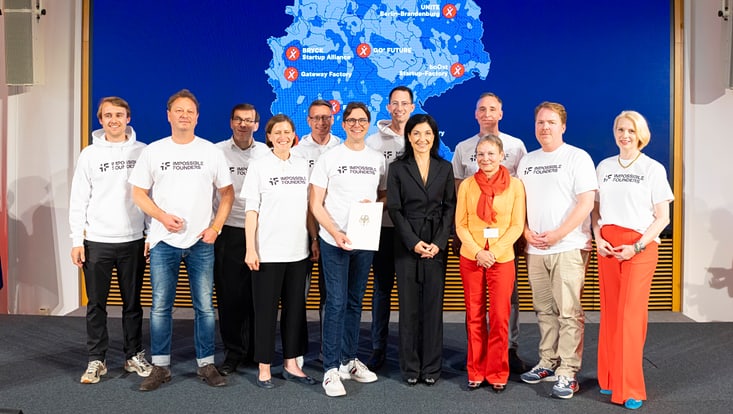More than 50 million euros for innovative Hamburg start-ups from the deep tech sectorHamburg wins startup competition
11 July 2025

Photo: BMWE/Dominik Butzmann
Germany needs more spin-offs from the scientific community in order to remain economically competitive on an international level. Promoting innovation and start-ups is therefore one of the federal government's key objectives. In the highly endowed "Startup Factories" competition organized by the Federal Ministry of Economics, Hamburg was selected as one of ten winning locations nationwide and will receive up to 10 million euros from the federal government to establish efficient structures for local startup promotion.
A further 40 million euros are available from Hamburg foundations and companies, which are participating in the unique joint application together with the universities and research institutions of the city and the metropolitan region. On the part of the Senate, the initiative is particularly supported by Senator for Economic Affairs Melanie Leonhard and Senator for Science Maryam Blumenthal.
"I am delighted and proud that the University of Excellence Hamburg, with its strategic focus on the twin transformation, is a scientific partner of this initiative in the metropolitan region. Together with our partners from science, business and society in Hamburg and the entire metropolitan region, we will strengthen the start-up culture in the field of deep tech and sustainable technologies and consistently implement the transfer from science to business and society," says Prof. Dr. Hauke Heekeren, President of Universität Hamburg.
The Hamburg Startup Factory "Impossible Founders" will specifically promote innovative spin-offs from science in the field of "deep tech", with a focus on green technologies and the development of new materials in connection with AI and data science. It will officially begin its work on October 1, 2025. It will initially be based at the "Digital Hub" in the Speicherstadt historical warehouse district.
Hamburg as a science and business location can thus continue to build on its successes: only at the end of May this year, the University of Hamburg and TU Hamburg were awarded the contract for their cutting-edge research in a total of five clusters of excellence as part of the Excellence Strategy of the federal and state governments. The "Startup Factory" is another important building block for Hamburg's innovative and economic future viability.
"Research in Hamburg in the field of deep tech is internationally leading. I know that there is enormous potential here for start-ups that could play at the forefront internationally. We in this truly impressive alliance of Hamburg partners are determined to unearth these treasures. I personally take winning the competition as a maximum motivation boost - I'm really up for it, we're all going to give it our all in Hamburg!" says Dr. Arik Willner, designated Managing Director of "Impossible Founders". Willner will take up his position on November 1, 2025.
The new company aims to make a significant contribution to the competitiveness and transformation of Hamburg's economy towards more technology companies. The aim is to increase the number of science-based start-ups and make the Hamburg metropolitan region one of the leading German locations for deep tech spin-offs.
The task of the Hamburg Startup Factory is to
- impart entrepreneurial know-how to students and researchers through internationally proven entrepreneurship education programs,
- support innovative, growth-oriented spin-offs across all phases of company development,
- to contribute to start-up-friendly, i.e. fast and affordable solutions for securing intellectual property rights - the so-called IP transfer,
- establishing links to the research-intensive economy with fields of application for greentech - from aviation and logistics to energy, chemicals and life sciences, and
- support the search for investors and provide start-up teams with access to research infrastructure.
The "Startup Factory" solves a major problem for deep-tech spin-offs
Technologically oriented start-ups are exposed to numerous risks after they are founded, generally have significantly higher capital requirements than other start-ups and have to adapt their business model to changing social and economic conditions. The funding structures in Germany are weak in this area. While there are good funding programs for basic research, there is little support for the risky phase of product development, prototyping and scaling shortly before or during market entry.
This is where the Hamburg Startup Factory "Impossible Founders" comes in and for the first time can offer a support structure to promote newly founded companies across all phases.
The Joachim Herz Foundation and the Michael Otto Foundation, which support spin-offs from science in Hamburg, are significantly involved in financing the project. On the corporate side, substantial financial commitments have been made by Hamburger Sparkasse, the semiconductor manufacturer Nexperia and the Otto Group.


